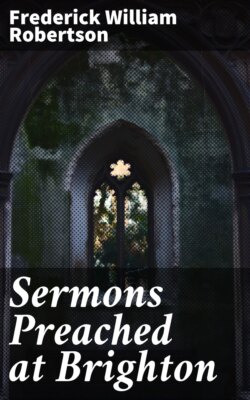Читать книгу Sermons Preached at Brighton - Frederick William Robertson - Страница 9
На сайте Литреса книга снята с продажи.
3. The spirit of society.
ОглавлениеThe World has various meanings in Scripture; it does not always mean the Visible, as opposed to the Invisible; nor the Present, as opposed to the Future: it sometimes stands for the secular spirit of the day—the Voice of Society.
Our Saviour says, “If ye were of the world, the world would love his own.” The apostle says, “Be not conformed to this world;” and to the Gentiles he writes, “In time past ye walked according to the course of this world, the spirit which now worketh in the children of disobedience.” In these verses, a tone, a temper, a spirit is spoken of. There are two things—the Church and the World—two spirits pervading different bodies of men, brought before us in these verses—those called the Spirit-born, and those called the World, which is to be overcome by the Spirit-born, as in the text, “Whatsoever is born of God overcometh the world.”
Let us understand what is meant by the Church of God. When we speak of the Church we generally mean a society to aid men in their progress God-wards; but the Church of God is by no means co-extensive in any age with that organized institution which we call the Church; sometimes it is nearly co-extensive—that is, nearly all on earth who are born of God are found within its pale, nearly all who are of the world are extraneous to it—but sometimes the born of God have been found distinct from the Institution called the Church, opposed to it—persecuted by it. The Institution of the Church is a blessed ordinance of God, organized on earth for the purpose of representing the Eternal Church and of extending its limits, but still ever subordinate to it.
The Eternal Church is “the general assembly and church of the first-born which are written in heaven;” the selected spirits of the most High, who are struggling with the evil of their day; sometimes alone, like Elijah, and like him, longing that their work was done; sometimes conscious of their union with each other. God is for ever raising up a succession of these—His brave, His true, His good. Apostolical succession, as taught sometimes, means simply this—a succession of miraculous powers flowing in a certain line. The true apostolic succession is—not a succession in an hereditary line, or line marked by visible signs which men can always identify, but a succession emphatically spiritual.
The Jews looked for an hereditary succession; they thought that because they were Abraham's seed, the spiritual succession was preserved; the Redeemer told them that “God was able of those stones to raise up children unto Abraham.” Therefore is this ever a spiritual succession—in the hands of God alone; and they are here called the God-born, coming into the world variously qualified; sometimes baptized with the spirit which makes them, like James and John, the “Sons of Thunder,” sometimes with a milder spirit, as Barnabas, which makes them “Sons of Consolation,” sometimes having their souls indurated into an adamantine hardness, which makes them living stones—rocks like Peter, against which the billows of this world dash themselves in vain, and against which the gates of hell shall not prevail. But whether as apostles, or visitors of the poor, or parents of a family, born to do a work on earth, to speak a word, to discharge a mission which they themselves perhaps do not know till it is accomplished—these are the Church of God—the children of the Most High—the noble army of the Spirit-born! Opposed to this stands the mighty confederacy called the World. But beware of fixing on individual men in order to stigmatize them as the world. You may not draw a line and say—“We are the sons of God, ye are of the world.” The world is not so much individual as it is a certain spirit; the course of this world is “the spirit which now worketh in the children of disobedience.” The world and the Church are annexed as inseparably as the elements which compose the atmosphere. Take the smallest portion of this that you will, in a cubic inch the same proportions are found as in a temple. In the ark there was a Ham; in the small band of the twelve apostles there was a Judas.
The spirit of the world is for ever altering—impalpable; for ever eluding, in fresh forms, your attempts to seize it. In the days of Noah, the spirit of the world was violence. In Elijah's day it was idolatry. In the day of Christ it was power concentrated and condensed in the government of Rome. In ours, perhaps, it is the love of money. It enters in different proportions into different bosoms; it is found in a different form in contiguous towns; in the fashionable watering place, and in the commercial city: it is this thing at Athens, and another in Corinth. This is the spirit of the world—a thing in my heart and yours: to be struggled against, not so much in the case of others, as in the silent battle to be done within our own souls. Pass we on now to consider—
